Understanding Maths Schools
Chris Brignell, Deputy Director
Last week the Observatory’s Andy Noyes and Chris Brignell attended governor’s day for U-Maths. U-Maths is the umbrella organisation for the specialist maths schools – sixth form colleges offering Maths, Further Maths, Physics and a limited diet of other A levels. The maths school concept is borrowed from Russia where it is recognised that some pre-university students would benefit from greater stretch and enrichment, and from being in an environment where they are surrounded by like-minded mathematical thinkers.
Maths schools occupy a unique space in our education landscape – being selective free schools, run by academy trusts, and sponsored by university maths departments. They also receive £350k from central government to be centres of excellence for mathematics teaching and to run outreach programmes to increase participation and attainment among underrepresented groups such as females and low-income families. The whole mathematics community should recognise the existence of maths schools is a privilege not enjoyed by other subjects.
The governor’s day brought together an interesting cross-section of mathematically interested people. Alongside the education researchers, school teachers, and university mathematicians that Andy and Chris normally connect with, the school governors representing parents and industry gave insight from outside the usual mathematics bubble. This made it a good forum to discuss the purpose of A level Mathematics. Is it to produce the mathematical thinkers that will go on to do PhDs and staff university maths departments? Is it to equip future scientists and social scientists with the advanced mathematics needed for degrees ranging from economics to physics? Or is it to make sure industry have sufficient future employees with good understanding of mathematical tools needed to make wise decisions?

As Andy highlighted in his after-dinner speech at the governor’s day, this is not a new conundrum for the mathematics community. To what extent should A level Mathematics and Further Mathematics problems be interesting for their own sake, or should they be focussed on using mathematics to solve problems in applied areas? The only thing the whole sector can probably agree on is that artificially forcing maths problems to fit unrealistic applications, such as questions involving ‘Sally purchasing 60 cantaloupes’, is unhelpful and a turnoff to students.
The existing evidence is that maths schools produce students with excellent outcomes. In 2023 91% of A level grades at King’s Maths School were grade A or A* with 33% of students going on to Oxbridge courses. A March 2024 Ofsted inspection of Exeter Maths School rated it Outstanding in all areas. All 2023 leavers of Liverpool Maths School progressed to university courses, the vast majority in mathematics, computer science or engineering. The student panel at the governor’s day, though, repeatedly put the value of Maths Schools not on high grade outcomes but studying in an environment where maths is valued, where they can work with friends to explore deeper mathematics problems beyond the A level curriculum, and where their teachers have sufficient passion and knowledge to be able to guide their mathematical development in response to their queries.
However, it seems the biggest challenge to Maths Schools is the physical environment. The original plan for maths schools was to open 12 between 2011 and 2014, but only 2 made that target. Then there was a gap until 5 opened between 2020 and 2023 and a further 4 are still at the pre-opening stage. Nearly all the schools have faced or still face delays with problems securing sites, or expanding or converting buildings, with some in temporary accommodation while the wheels of public-funded capital projects turn slowly.
At the Observatory we will shortly be starting a project to fully understand the benefits of maths schools. Does their value lie in boosting academic outcomes, or in changing the way their students think about maths, or in the impressive array of outreach activities they do across their respective regions? Or does concentrating the talent in maths schools have potential for introducing negative unintended consequences for the wider system?
Maths schools are just one policy area that we will be investigating. If you have ideas for other areas of maths education policy that the Observatory should explore then let us know.
Author information
Chris is the Deputy Director of the Observatory and an Associate Professor of Statistics in the School of Mathematical Sciences.
Observatory for Mathematical Education team
Chris Brignell on X
Observatory for Mathematical Education on LinkedIn.